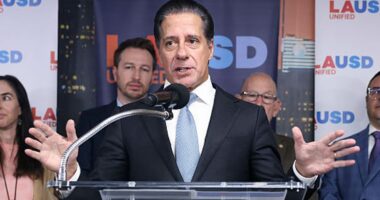Share this @internewscast.com
The housing market in Washington is beginning to show significant weaknesses as the federal government shutdown continues without resolution.
Recent statistics indicate a sharp decline in home listings and a noticeable waning of buyer enthusiasm throughout the region.
According to Realtor.com, since the shutdown commenced on October 1, there has been a drop of over 11 percent in searches for new home listings.
The Bureau of Labor Statistics notes that more than 10 percent of the workforce in the DC metro area comprises federal employees.
As many of these workers face furloughs, consider buyouts, or worry about missing their paychecks, their concerns are beginning to impact the housing market.
“Currently, we are experiencing the highest inventory levels in DC in the past five years,” Corey Burr, a senior vice president at Sotheby’s International Realty, shared with the Daily Mail.
‘It’s the longest days on market in the last five years, at an average of 47 days for DC proper. That’s 50 days longer than any other area in the region.’
Burr said the combination of the DOGE worker purge and the shutdown has frozen many buyers in place.

The Washington metro area’s housing market is showing signs of serious trouble as the federal government shutdown drags on

New data reveals double-digit drops in home listings and little buyer interest across the Washington, DC metro area

‘Right now we’ve got the highest inventory in DC for the last five years,’ senior vice president at Sotheby’s International Realty, Corey Burr said
‘The federal government workers who are being affected by buyouts or furloughed or not being paid right now have put real estate purchases on hold,’ Burr said.
Another stat from the Greater Capital Area Association of Realtors said the median list price is 13.3 percent higher in September 2025, but that that only means things are also being listed at the higher end of the market, bringing up the average.
The average DC home value is currently $583,202.
‘I think in the short term there’s going to be exponential pressure on the market and the economy the longer this shutdown lasts,’ Burr said.
‘There’s weakening in the economy, there’s layoffs were witnessing, the interest rate are around six percent.’
But, burr adds if the interest rates are lowered, he predicts things will bounce back.
‘If we can get them down into the mid-fives I anticipate the residential real estate market is gong to have a bump in 2026,’ he said.
But for now, the uncertainty about tariffs is also creating economic uncertainty, he said, and the more nervous people become the more buyers and sellers stay put.

A home sits outside Capitol Hill as federal government workers who are being affected by buyouts or furloughed or not being paid right now have put real estate purchases on hold

The National Mall in DC, where the average home value is currently $583,202 and both buyers and sellers affected by the shutdown are scared

Washington Monument on the Reflecting Pool in DC, where the shutdown continues to drag on and affect homeowners who can’t sell

At the root of the DC real estate crisis is the shutdown, which happened on October 1 after Republicans and Democrats failed to pass a new budget
It’s not only the housing market that looks bleak in DC.
A Bank of America credit and debit card report shows DC consumers are not spending as much as they normally would.
Since the shutdown began, total card spending per household is down more than one percent.
At the root of the problem is the shutdown, which happened on October 1 after Republicans and Democrats failed to pass a new budget.
That put numerous federal programs and public services on hold, and hundreds of thousands of federal workers are currently not receiving a paycheck.
The longer the shutdown continues, the more damage the DC and national economies will see.
The last time an extended shutdown happened, 35 days from December 2018 to January 2019, DC lost nearly $50 million in revenue, according to the city’s official financial office.
Burr said he expects things to straighten out when the shutdown ends.

The DC real estate market is in crisis as federal government workers nervous about the future are putting real estate purchases on hold
‘It’s hard for those furloughed or laid off in the federal government, but the region and job market here is so diversified that it’s really kind of just a blip in our real estate market,’ he said.
Other areas will still be hurting, though.
As of November 1, 42 million Americans dependent on government assistance for food will be cut off.
Funding for the Supplemental Nutrition Assistance Program, also known as SNAP, is set to expire.
The program disburses funds on a monthly basis onto a debit card, which recipients can use to buy grocery items.
The average monthly SNAP benefit is $187 per person, but without a vote to end the government shutdown, that stipend won’t be dispensed.

















